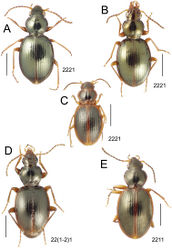Mecyclothorax castaneus
| Notice: | This page is derived from the original publication listed below, whose author(s) should always be credited. Further contributors may edit and improve the content of this page and, consequently, need to be credited as well (see page history). Any assessment of factual correctness requires a careful review of the original article as well as of subsequent contributions.
If you are uncertain whether your planned contribution is correct or not, we suggest that you use the associated discussion page instead of editing the page directly. This page should be cited as follows (rationale):
Citation formats to copy and paste
BibTeX: @article{Liebherr2013ZooKeys322, RIS/ Endnote: TY - JOUR Wikipedia/ Citizendium: <ref name="Liebherr2013ZooKeys322">{{Citation See also the citation download page at the journal. |
Ordo: Coleoptera
Familia: Carabidae
Genus: Mecyclothorax
Name
Mecyclothorax castaneus Perrault, 1986: 455 – Wikispecies link – Pensoft Profile
Identification
Among the smaller-bodied members of the Mecyclothorax viridis group with elytral striae 1–5 continuously impressed to the elytral basal groove (Fig. 31), this species can be diagnosed by the rufopiceous dorsal body coloration (Fig. 31D) and the well-developed microsculpture: 1, head covered with regular transverse mesh across frons, neck with isodiametric sculpticells; 2, pronotal disc with densely packed transverse microsculpture, consisting of elongate transverse sculpticells and unconnected transverse lines; and 3, elytral discal intervals bearing gratelike transverse microsculpture consisting predominantly of transverse lines, with some areas including crossconnections resulting in an elongate transverse mesh. Summarizing the type series of two specimens (Perrault 1986[1]) plus six more specimens collected in 2006, only the 1986 female paratype unilaterally possesses a posterior dorsal elytral seta, the other elytron bearing only the anterior dorsal seta. Thus the most usual setal formula is 2211, a formula shared with Mecyclothorax paahonu, below. The male aedeagal median lobe is gracile and elongate, with an apicodorsal hooklike expansion (Fig. 30E). Standardized body length 3.8–4.1 mm.
Distribution and habitat
In 1977, Perrault (1986)[1] collected two specimens between 900 and 1100 m elevation on Mont Marau. In 2006 that elevational zone had become invaded with Albizia chinensis (Fabaceae) and was too dry for successful collecting. That year specimens were collected at 1275–1335 m elevation, through beating soft ferns and mossy Weinmannia branches, and via the use of pyrethrin fog on a tangled bank of dead ferns and a horizontal, moss-covered Weinmannia log.
Taxon Treatment
- Liebherr, J; 2013: The Mecyclothorax beetles (Coleoptera, Carabidae, Moriomorphini) of Tahiti, Society Islands ZooKeys, 322: 1-170. doi
Other References
- ↑ 1.0 1.1 Perrault G (1986) La faune des Carabidae de Tahiti VII. révision du genre Mecyclothorax (Sharp) (Psydrini). 2. les groupes de M. striatopunctatus n. sp., M. dannieae Perrault, M. marginatus Perrault et M. viridis Perrault (Coleoptera). Nouvelle Revue d’Entomologie (NS) 3: 439-455.
Images
|

